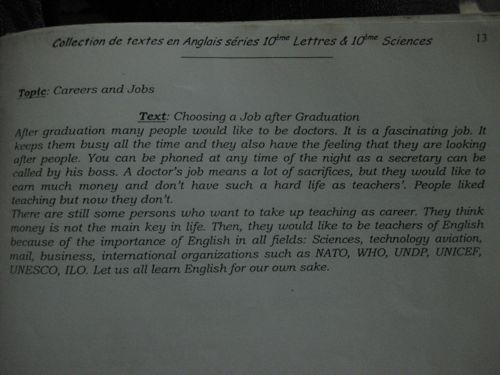Tuesday, October 25, 2011
Progress and More on the Problems we Face
We are moving quickly towards opening the library. The last of the construction and the paint job are supposed to be done today, we got a great discount on furniture which my host brother, a carpenter, is making for us, and we're working out the pricing on the Malian textbooks we need. In short, everything is on schedule to open on November 1st.
All of these developments are great, and we are so excited, but at the same time every day things happen which remind us of all the difficulties Malian kids face in their education. For me, this has been most evident recently helping kids in my host family's house with their homework. Mostly I work with my 17-year-old sister who is in her last year of high school and preparing for the all-important Bac (Baccalauréat) exam. Because she is in the “Languages and Literature” track, English is going to be one of her main subjects on the exam and I, by virtue of speaking English, am a natural choice for a tutor. Granted, my sister is not the most serious student, and getting her to focus on anything even in a one-on-one situation is a challenge, but she has been taking English since 7th grade, so I was more than a little alarmed when she didn't recognize “How are you?” in writing the other day. From what I can tell about her class (reading between the lines of potentially overdramatic explanations) her teacher dictates to the class in English for over an hour straight. This dictation may cover grammar and vocabulary or “contemporary” topics such as “Immigration in the United States” or “The Situation of Modern American Blacks.” Most of the vocabulary is far removed from students lives and the content is often questionable at best. Many English teachers here do not actually speak English much better than their students, leading to interesting conclusions as to what is “correct.” Below is a nice example of what she was supposed to learn in 10th grade.
When I am not tackling “Immigration in America,” I also help my 9-year-old niece with the various homework she brings home from 4th grade. She is usually first or second in her class, loves school, and is naturally extremely curious. First, on the subject of that curiosity. While my niece is often praised for doing well in school, curiosity is regarded as strange and unnatural in someone her age. People routinely refer to her as creepy or chase her away from me threatening to hit her if she asks too many questions. Working together on homework, on the other hand, is considered acceptable, so on to that.
While her spoken French has considerably improved since last time I was here and she eagerly incorporates my corrections (always making sure to correct my mistakes in Bambara as well), she still cannot read more than a few words. I realized this as we were going over her history homework (a few questions about a paragraph on her school's history). I asked her to read the first question to me and she said, “I haven't learned it yet.” She memorizes every single lesson, word for word (which is in itself something of an amazing talent). I help her with some of the things she has to recite, usually lessons in either “Civic and Moral Education” (ex. “I never play on bridges because I might fall into the water” or “I behave well in the street and I am always polite”) or “Observation Sciences.” Our first Observation text was about knives. It basically described a knife and what it did. The question my niece couldn't remember the answer to was “What are the two parts of a knife?” so I drew a picture of a knife and asked her which part was the handle. Of course, she didn't know that the word handle meant, so she indicated the blade. I felt like if the teacher had just brought a knife to class, or drawn one on the board, this could have been avoided. I got so frustrated with this that one night I asked one of our friends who is particularly good at French when he learned to read, explaining that my niece was in 4th grade but only memorized things. He said “She's only in 4th grade? She's doing great! I learned to read in 5th grade, maybe 6th.”
We hope that offering access to books and literacy activities from 1st grade on will help students at our partner school start better understanding their lessons earlier and making connections between words on the blackboard and the real world.
PS This whole post focused on in the classroom issues, I'll write soon about the difficulties of balancing schoolwork and chores and finding a moment to concentrate in the house.
Subscribe to:
Post Comments (Atom)

No comments:
Post a Comment